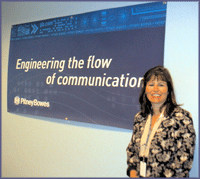|
Pitney Bowes -
Public / Private Partnership

Pitney Bowes is the world's leading
provider of integrated mail and document management systems, services,
and solutions. The company's products enable the processing, folding,
and inserting of 100 million pages of financial credit card statements
each month. The US Postal Service receives more than $15 billion each
year, 61% of its annual metered postage revenue, from 1.4 million Pitney
Bowes mailing systems.
The company manages facilities that
produce 1.7 million copies hourly. With more than 3,500 patents
worldwide to its credit, Pitney Bowes is among the top 200 firms
receiving US patents. More than 35,000 individuals are employed by
Pitney Bowes mail and document solutions for more than 2 million
customers in 130 countries worldwide. In the June/July issue (2003) of
Diversity Inc. magazine, Pitney Bowes is ranked 27th nationally for the
diversity of its workforce and was cited for recruitment of qualified
individuals with disabilities.
Disability Practices
In the Spokane area, the company has
hired 400 people in the last 12 years at its North Atlantic Street
site to handle billing issues, customer equipment consultation, and
customer retention. The site handles 12-14,000 calls daily which
includes all customer calls west of the Mississippi. Ms. Besenyody
was initially exposed to a pool of qualified individuals with
disabilities by S.L. Start, a Rehabilitation Services Administration
which funds Project With Industry. She indicated that she was
particularly impressed by Project With Industry's emphasis on
learning "how we do business" at their work site.
|
“Our employees with
disabilities are role models, they have above average productivity
and almost optimal attendance.”
Terry Besenyody,
Mgr. HR
|
Pitney Bowes made a commitment to
establish 2% of its workforce as qualified individuals with
disabilities. The company has more than exceeded this goal, and now 6%
of the employees on site (24 individuals) have diverse disabilities. Ms.
Besenyody has also been recruited to serve on the Project With
Industry's advisory board, and Pitney Bowes has become a leader in the
establishment of the area's Business Leadership Network (BLN). Pitney
Bowes, along with other area companies, has led the effort to secure
State Division of Vocational Rehabilitation funding for part of the BLN
infrastructure and job placement centrix.
Of particular interest is the company's effort to engage in reasonable
accommodation. The company has hired individuals with disabilities such
as deafness, diabetes, blindness, mental illness and back injuries.
Adaptations have included such items as a headset with magnified sound
(employee with legal deafness), computer screen magnifications (employee
with legal blindness), screen magnifier on eyeglasses (employee with
visual field cut), chair adaptation and risers (allowing an individual
to be supported while standing) for individuals with back injuries who
require changes in positions, etc.
Ms. Benesyody indicates that prevailing employer attitudes about
individuals with disabilities can be "ridiculous". She describes her
employees with disabilities as "role models" relative to both work
productivity and attendance. In relation to other employees these
individuals have above average productivity and almost optimal
attendance. In addition to outreach activities, Ms. Besenyody assisted
the state vocational rehabilitation agency in developing a job seeking
skills program and developed program segments related to optimal
interviewing techniques.
The company is very willing to
spend funds on accommodations, generally with some state agency match.
Most of the accommodations at the Spokane site have been under $500
per employee with disability - a very reasonable expenditure. -
Terry Besenyody
The company has also made a commitment to
mentor high school students with disabilities. They have provided
internships to the students with disabilities from the Goodwill's High
School/High Tech Program. In addition to its efforts to outreach to
these individuals, the company has also made exemplary efforts to engage
new employees through the Work First Program for those subsisting on
welfare funding. In recent years, Pitney Bowes has hired 80 new
employees through the Work First Program. Ms Besenyody is curious as to
why more companies don't make efforts to hire with disabilities. She
states that “the company is very willing to spend funds on
accommodations, generally with some state rehabilitation agency match.
Most of the accommodations at the Spokane site have been under $500 per
employee with a disability, a very reasonable expenditure.”
Unique Aspects of the Outreach Effort
- Ms. Besenyody and Pitney Bowes have
truly engaged the rehabilitation community, not only in relation to
outreach, but in preparing individuals with disabilities for entering
into the workforce and attempting to develop an infrastructure for
hiring individuals with disabilities through the Spokane area (BLN).
She has taken a leadership role with the local Project With Industry
and also in assisting the State Division of Vocational Rehabilitation.
This is an exemplary expenditure of both time and business expertise.
- There is a true emphasis at Pitney
Bowes on makeing accommodations for their employees with disabilities.
A number of companies make an attempt to outreach to those individuals
with disabilities, but the emphasis on making reasonable accommodation
is not prevalent.
- Identifying an actual percentage or
workforce quota for involving qualified individuals with disabilities
at Pitney Bowes is unique. The company is truly making an effort to
have a diverse workforce that reflects its customer base and
communities in which it does business. The company's number 27 ranking
by Diversity Inc. magazine reflects this effort. It has received
numerous awards for its disability related efforts, including the 2001
Prism Award for Successful Efforts in the Hiring of Qualified
Individuals with Disabilities, the 2001 State of Washington Governor's
Committee on Disability Issues and Employment Certificate of
Appreciation, and the 2002 Spokane Mayor's Human Rights Award,
Honorable Mention, for its efforts to hire and retain workers with
disabilities.
For information regarding this Case Study contact:
Terry Besenyody, Manager,Human Resources
(509) 363-3685
terry.besenyody@pb.com
For information regarding this Case Study
contact:
Other Case
Studies
|
